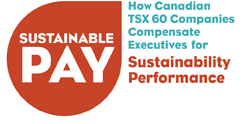I welcome Toby Heaps, CEO of Corporate Knights to my blog page. As a leading Canadian and international voice for clean capitalism and business sustainability, Toby provided insightful feedback to my recently released report, Sustainable Pay: how TSX 60 companies compensate executives for sustainability performance. I am honoured that Toby has taken time to provide his perspective in this post. I hope you enjoy it. Please send us your thoughts.
Guest blog by Toby Heaps:
 April 20th, 2010 was the ‘deepwatergate’ moment for corporate governance. That was the day when BP’s Deepwater Horizon drilling rig exploded, killing 11 people, spilling millions of barrels into the Gulf of Mexico, causing untold environmental harm and ultimately costing BP tens of billions of dollars in damages. Six months later, Bob Dudley, BP’s newly minted group chief executive, wrote an internal memo to his staff declaring that safety would be the sole criterion for rewarding employee performance in its operating business for the fourth quarter. One wonders what would have happened had a savvy institutional investor taken a look at BP’s financial sanctions from the US Environmental Protection Agency (EPA) and the Occupational Safety and Health Administration (OSHA) before the Deepwater Horizon explosion. In the five years leading up to the incident, BP had been hit with more EPA and OSHA fines and penalties than Shell, Chevron, Exxon Mobil and ConocoPhillips combined. If BP had felt heat from its investors and moved earlier to realign compensation incentives, could the lives lost, ecosystem damage and balance sheet destruction have been prevented?
April 20th, 2010 was the ‘deepwatergate’ moment for corporate governance. That was the day when BP’s Deepwater Horizon drilling rig exploded, killing 11 people, spilling millions of barrels into the Gulf of Mexico, causing untold environmental harm and ultimately costing BP tens of billions of dollars in damages. Six months later, Bob Dudley, BP’s newly minted group chief executive, wrote an internal memo to his staff declaring that safety would be the sole criterion for rewarding employee performance in its operating business for the fourth quarter. One wonders what would have happened had a savvy institutional investor taken a look at BP’s financial sanctions from the US Environmental Protection Agency (EPA) and the Occupational Safety and Health Administration (OSHA) before the Deepwater Horizon explosion. In the five years leading up to the incident, BP had been hit with more EPA and OSHA fines and penalties than Shell, Chevron, Exxon Mobil and ConocoPhillips combined. If BP had felt heat from its investors and moved earlier to realign compensation incentives, could the lives lost, ecosystem damage and balance sheet destruction have been prevented?
Pay remains a powerful motivator
We will never know for sure, but we do know that despite the predictable irrationality of humans in many contexts, pay remains a powerful motivator. What we pay people to do really matters and is at the absolute core of corporate governance. So it stands to reason that we should make sure we are paying people to do what really matters.
80 per cent of share price related to reputation
We live in a globalized era in which natural resources and reputation matter like never before. On the backs of the burgeoning billions of middle class consumers, real commodity prices have rocketed by 147 per cent in just the past 12 years, making natural resource productivity increasingly relevant to a company’s ability to create value. In stark contrast to just a few decades ago, the majority (80 %) of a company’s share price is now based on a bubble of intangible assets, which expands or contracts largely based on reputation. As a result, natural resource use and the social and environmental factors that impact reputations are strategic imperatives for public companies. That’s why investors are beginning to demand that companies better align relevant sustainability factors with compensation.
Sustainable pay still wild west but harnessing its power will build better companies
Against this backdrop, Coro Strandberg’s first-of-its-kind systematic study into the sustainable pay practices of TSX 60 companies is a welcome injection of coherence. Her finding that 57 per cent of companies already consider sustainability factors in the annual incentive plan shows that the Rubicon has been crossed. While sustainable pay is still a wild west, this report contains many sensible recommendations for harnessing its power to build better companies and a better world.
See an infographic snapshot of the report findings or read the full report Sustainable Pay: how TSX 60 companies compensate executives for sustainability performance. We welcome your feedback.


